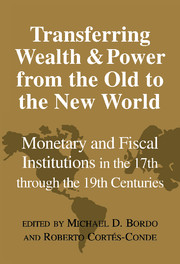 Transferring Wealth and Power from the Old to the New World
Transferring Wealth and Power from the Old to the New World Published online by Cambridge University Press: 27 March 2010
Each of the contributions to this volume on fiscal and monetary institutions attempts in one way or another to describe and to interpret the historical role of the state in promoting economic development. Not surprisingly, the volume exhibits a tension between alternative characterizations of the state and between two associated ways to think about economic policy. Both of these characterizations are prominent in current research in positive political economy.
One characterization views the state as an agent of its citizens – specifically, the agent to which the citizenry assigns the task of effectuating collective choices about resource allocation and income distribution. In this characterization, the power to tax serves as the state's essential method of enforcing collective choices. Taxation is the means by which the state prevents free riding on the provision of nonexcludable public goods.
In characterizing the state as an agent of its citizens, we implicitly define the citizenry to be the politically enfranchised subset of those people who are under the dominion of the state. In other words, the citizens are those subjects of the state who have political power. Given the characterization of the state as an agent of its citizens, basic problems for understanding the historical role of the state in promoting economic development are to identify the subset of subjects who comprise the citizenry and to explain the determination of this subset.
To save this book to your Kindle, first ensure no-reply@cambridge.org is added to your Approved Personal Document E-mail List under your Personal Document Settings on the Manage Your Content and Devices page of your Amazon account. Then enter the ‘name’ part of your Kindle email address below. Find out more about saving to your Kindle.
Note you can select to save to either the @free.kindle.com or @kindle.com variations. ‘@free.kindle.com’ emails are free but can only be saved to your device when it is connected to wi-fi. ‘@kindle.com’ emails can be delivered even when you are not connected to wi-fi, but note that service fees apply.
Find out more about the Kindle Personal Document Service.
To save content items to your account, please confirm that you agree to abide by our usage policies. If this is the first time you use this feature, you will be asked to authorise Cambridge Core to connect with your account. Find out more about saving content to Dropbox.
To save content items to your account, please confirm that you agree to abide by our usage policies. If this is the first time you use this feature, you will be asked to authorise Cambridge Core to connect with your account. Find out more about saving content to Google Drive.